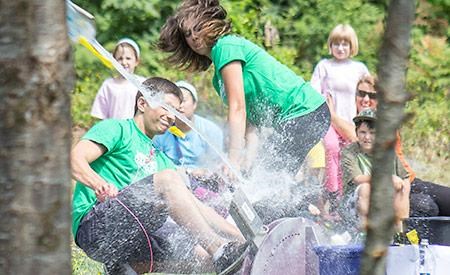While some of Powell River’s youth spend the lazy days of summer vacation at the beach, others are diving into science and engineering. And what they’re discovering is that experiments can be a lot of fun.
For the first time this year, Powell River has been included in the University of Victoria (UVic)’s Science Venture Camp, a non-profit organization that travels around the province an offers students, primarily from first nations communities, fun hands-on learning opportunities.
“It’s all about trying to pique [the student’s] interest in science and getting them a practical kind of experience,” said Gerry Brach, the camp’s local organizer. “It’s stuff that grabs their attention and gets them thinking about science.”
For the past six years Brach has been leading Tla’amin (Sliammon) Nation’s Technology and Recreation summer camp. After discovering the UVic program last year he decided to contact the university for more information.
Brach, a retired teacher and counsellor, had been doing some reading on student success in science and math, particularly for first nations students, and found that education in these areas needs to be more engaging for younger students.
“If kids at a very young age, in grades two or three, decide that they don’t like math and science, then they don’t do a lot when they go to high school,” said Brach. “It’s so limiting.”
He noted that many of the better paying jobs available these days require strong science and numeracy skills.
Brach remembers that when he was an elementary student there seemed to be more opportunities for small hands-on science projects, like growing plants and raising chicks in the classroom.
With the demands on teachers now and not having access to resource centres, when they do teach science a lot of it is book-based, he said.
He said that after reading the research he started thinking about ways of trying to get students interested in science and math at an earlier age.
Last June four instructors from Science Venture came to James Thomson Elementary to present workshops for the students and generate interest in the camp.
The school district had to step back from the camp because of the teachers’ contract dispute, leaving Tla’amin to organize it.
Science Venture is a two-week camp for students in grade one through eight being held at Tla’Amin Salish Centre. The first section ran from August 11 to 15 and the second goes from August 18 to 22.
Rachel Koopman-Gough has both of her children, Tyler, turning nine years old later this month, and Mimi, who is five and a half, enrolled in the camp. She said that the camp has been “phenomenal” and “can’t say enough good things about it.” She said that she is amazed by the amount of attention and focus the students are able to bring.
On the first day campers participated in an adapted version of “Mythbusters,” a popular TV show which uses science to test urban legends.
She said that the instructor asked the campers if they could stand on eggs without breaking them. Of course, no one thought it possible.
The instructors then brought out a carton of 36 eggs wrapped in plastic.
The campers then took turns standing on the carton and nothing broke, she said.
After, they all sat down to talk about why the eggs did not break and learned about how arches work, she said.
Later the same week the campers learned about air pressure and rockets and were able to launch water bottle rockets they designed.
The camp is being led by UVic pre-med students Max Moor-Smith and Jordan Thisdelle.
During the month of July Moor-Smith and Thisdelle traveled to communities on the North Coast putting on camps.
Thisdelle said that coming to Powell River they were well-prepared with a range of activities suited to different ages and group dynamics.
Moor-Smith said that in other communities they have been putting on day-long camps, but for Powell River they only have three hours “to do a lot of science, activities and games.”
“There’s no time for just sitting around,” he said. “We cover a lot.”
Moor-Smith said that with shrinking school budgets, many students particularly those in rural communities, do not have the same opportunities to be engaged.
“I remember as kid going to Science World [in Vancouver] and seeing the shows there,” said Moor-Smith. “It was super cool and that’s what got me into what I’m doing now.”
He added that he hopes that what he is doing here will similarly inspire his campers.



